Nelsons led with complete command, brilliantly revealing every twist and turn
“Under Andris Nelsons’s impassioned leadership, the BSO brilliantly essayed this challenging score… Nelsons led with complete command,...
Nelsons led with complete command, brilliantly revealing every twist and turn
“Under Andris Nelsons’s impassioned leadership, the BSO brilliantly essayed this challenging score… Nelsons led with complete command,...
So auch Andris Nelsons, der das BRSO konzentriert und feinfühlig dirigierte und wie immer beeindruckend gut vorbereitet hatte.
“So auch Andris Nelsons, der das BRSO konzentriert und feinfühlig dirigierte und wie immer beeindruckend gut vorbereitet hatte. Und das bei Stücken,...

Der Dirigent Andris Nelsons ist zu Gast beim BRSO. Das Programm bietet diesmal eine Mischung aus gesellschaftlichen Denkanstößen und musikalischer Tradition - von Ravel, über Strauss bis Carlos Simon.
BR-KLASSIK Foto: Der Dirigent und frühere Trompeter Andris Nelsons (rechts) mit dem Trompeter Hakan Hardenberger im Herkulessaal. © BR/Astrid...
Nuanced shading and dynamics plus seamless phrasing immersed the hall in billowing clouds of mist and the listener in an eerie dream world of sleepwalkers troubled by things that go bump in the night.
Nuages begins with a phrase from clarinets and bassoons suggestive to some ears of the Dies irae. It and the English horn’s interventions add a somber...
...the finale’s faultlessly blended and balanced last chord, which was stunningly jewel-like: radiant, pristine, transcendent.
“In Nelsons’ depiction of the hero and during the climactic battlefield movement, there was enough swagger and sweep from the BSO’s...
The orchestra responded with complete commitment playing with fire and precision throughout the evening and with some of the most arresting soft playing ever heard.
“Nelsons raised his baton and the Boston Symphony snapped to attention. The Adagio introduction to the opening of the First with its harmonic...
Under Nelsons, the strings alternate between warm and cool, between slender and lush.
“A storm of enthusiasm for Anton Bruckner’s Eighth Symphony. Cheers for the Berlin Philharmonic under guest conductor Andris Nelsons. It’s a...
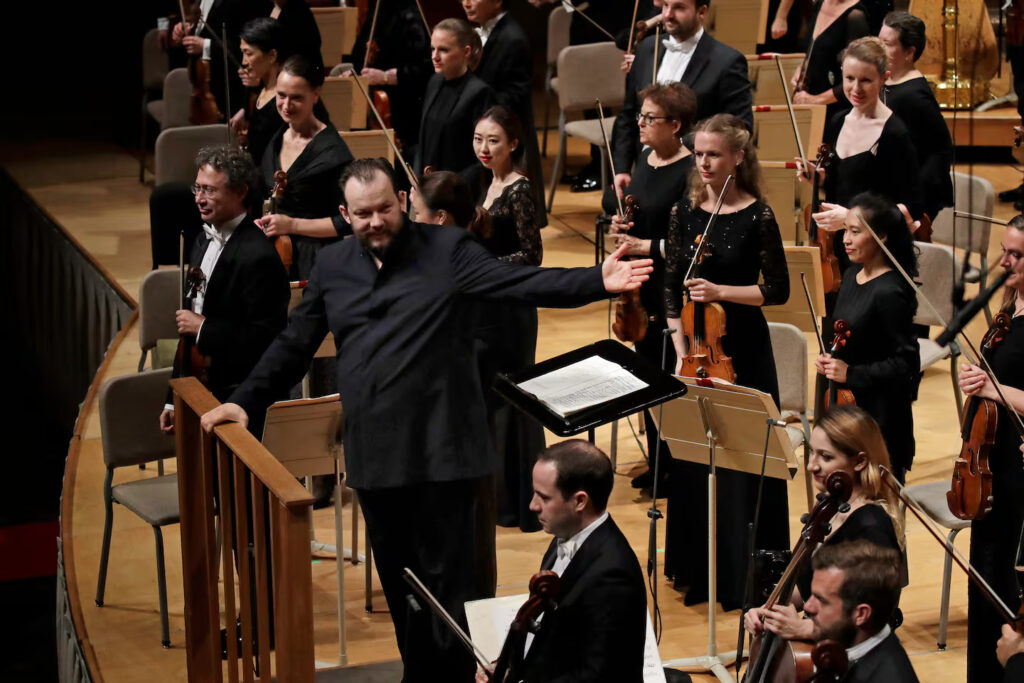
BSO music director Andris Nelsons is helping to write the German city’s next musical chapter through an auspicious alliance
The Boston Globe Photo: Elise Amendola/Associated Press In Leipzig, classical music history is everywhere you turn. At St. Thomas Church just a few steps from...
Und auch live durfte man hier staunen über die Monumentalarchitektur, die Nelsons klar und ehrfurchtsvoll, aber ohne Weihrauchschwaden freilegte dank eines Weltklasse-Orchesters von erlesenem Schönklang. Die „Wunderharfe“ aus Leipzig!
“Zum Höhepunkt des Abends indes, zum Seelengemälde zwischen Abgrund und Paradies geriet zweifellos die „Sechste“ von Anton Bruckner. Dass...
Nelsons gelingt es, dieses auskomponierte Verlöschen in ein kaum mehr hörbares Pianissimo zu überführen, das ein Gefühl von Transzendenz auslöst.
“Vielleicht braucht es aber auch die Lesart von Andris Nelsons, um von der Deutung des finalen Adagios als ersterbendes Verlöschen oder des dritten...

“There’s never an end moment where you say: ‘We’ve rehearsed, and this is exactly how we’re going to play.’ It’s a constant journey.”
The Boston Globe To much of the world, Andris Nelsons is known as a globe-trotting conductor, avirtuoso interpreter of orchestral works with dual posts at the...
Momentum and intensity, not speed, took primacy. Each surging accent was deliberate and ominous, and all we could do was listen.
“In concert, some conductors like to push the tempos in the louder sections of the “Rite,” perhaps thinking that it’ll better convey the music’s...
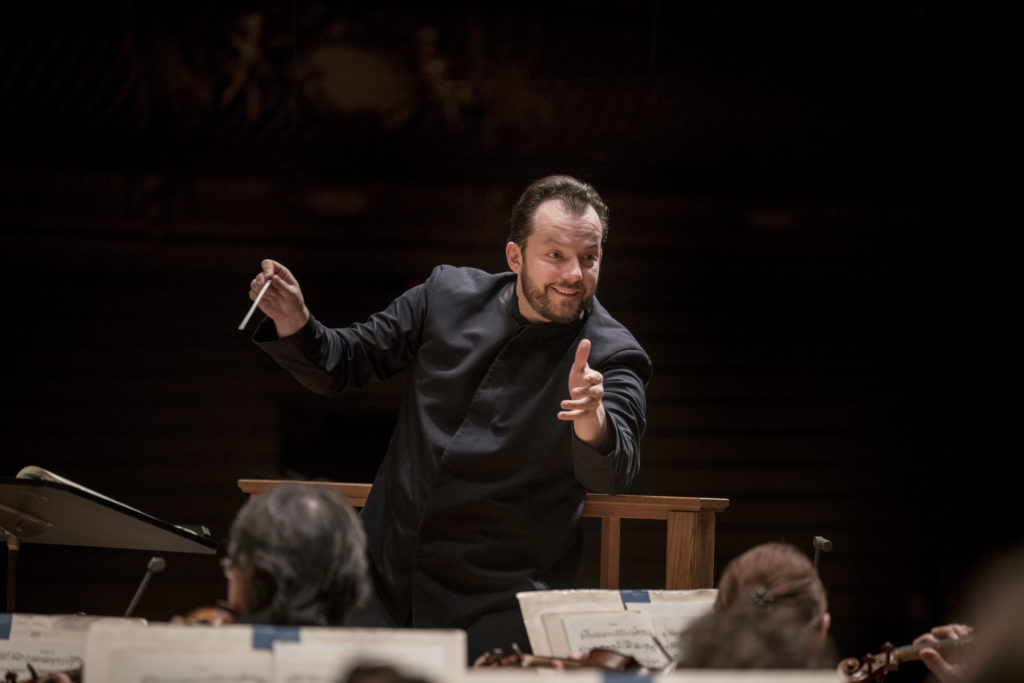
Werke von Wolfgang Amadeus Mozart, Richard Wagner und Dmitrij Schostakowitsch in einer Konzertaufnahme vom 07.03.2013
Andris Nelsons und die Berliner Philharmoniker spielten am 07. März 2013 ein Programm, das durch die Musikgeschichte führt. Wolfgang Amadeus Mozarts Sinfonie...
Ein sehr vielseitiges Programm hat Dirigent Andris Nelson für seinen Gastauftritt bei den Berliner Philharmonikern zusammengestellt
Ein sehr vielseitiges Programm hat Dirigent Andris Nelson für seinen Gastauftritt bei den Berliner Philharmonikern zusammengestellt: Die eher feine 4....
Andris Nelsons is a Bruckner interpreter of the highest order, and the way he builds from the bottom up is truly second nature to him.
“Andris Nelsons is a Bruckner interpreter of the highest order, and the way he builds from the bottom up is truly second nature to him. The Leipzig...
“The clarity with which the Boston precision orchestra plays the piece is striking, the childlike warmth that Nelsons finds in it is touching."
“Nelsons fully lives up to his status as a world-class conductor by being richly invested in musical detail alongside an unerring sense of formal structure....
Nelsons war also das, was dieses Orchester im günstigsten Fall zu herausragenden Ergebnissen zu nützen weiß...
“Die Philharmoniker ein Stück weit in Ruhe zu lassen, ihnen Entfaltungsspielraum zu geben, nicht im Moment der Aufführung noch ständig etwas zu...
Saturday’s production was musically satisfying and beautifully played... This was aided by Nelsons’s crisp conducting and the occasional arpeggio from a harpsichord in the recitatives.
“In the Koussevitzky Music Shed at Tanglewood on Saturday night, Andris Nelsons led the Boston Symphony Orchestra in a concert performance of Mozart’s...
In Brahms’s Violin Concerto, with the always welcome Hilary Hahn, the interplay between soloist, conductor, and orchestra charmed our eyes.
“In Brahms’s Violin Concerto, with the always welcome Hilary Hahn, the interplay between soloist, conductor, and orchestra charmed our eyes. Hahn...
The Boston Symphony Orchestra and its Music Director Andris Nelsons opened their second night at Carnegie Hall with superb clarity and precision in Sibelius’s Luonnotar; the muted semiquavers in the strings were utterly captivating, setting the stage for soprano Golda Schultz, who sang with remarkable character, range and control.
“The Boston Symphony Orchestra and its Music Director Andris Nelsons opened their second night at Carnegie Hall with superb clarity and precision in...
Silence filled the hall as Andris Nelsons’s outstretched hands hung over the conductor’s podium... The audience, transfixed, was finally released from the bondage of transcendental music.
“Silence filled the hall as Andris Nelsons’s outstretched hands hung over the conductor’s podium. A smattering of stray claps echo from the back,...
Nelsons’s prowess as a conductor shone in the Allegro non troppo, which expands themes from earlier in the symphony, until the trumpet introduces a novel melody transferred to the strings.
“In the Allegretto, the delightful spoof on the waltz form emerged, as Nelsons painted the scene of dance and rivalries. The Largo presents a requiem,...
Nelsons and BSO make Shostakovich shine
“Sometimes obscure symphonies are obscure for no discernible good reason, but it’s not too hard to guess why this symphony never made it into the core...
Clear and restrained, Pultstar Andris Nelsons synchronizes every single cog of this complex sound machinery.
“Clear and restrained, Pultstar Andris Nelsons synchronizes every single cog of this complex sound machinery.” “In the second...
In the brief fourth movement, it becomes clear why Andris Nelsons is one of the most celebrated conductors of our time
“In the brief fourth movement, it becomes clear why Andris Nelsons is one of the most celebrated conductors of our time. Passionate but restrained, he...
Salzburger Nachrichten Mitten im Bläsergetöse des ersten Satzes von Béla Bartóks 2. Klavierkonzert bringt Yefim Bronfmans virtuoses Fingerspiel Klarheit in...
“But whoever dedicates himself to [Dvorák’s Symphony Nr. 6] so precisely, joyfully and lovingly, sweeps the audience off its feet! (…) The huge...
“Latvian conductor Andris Nelsons used the Viennese fundamental classical sound to present the lyrical passages of [Shostakovich’s Symphony No. 9] as well...
Dresdner Neueste Nachrichten Andris Nelsons und die Wiener Philharmoniker sorgten für einen absoluten Höhepunkt bei den Dresdner Musikfestspielen. Wenn sich...
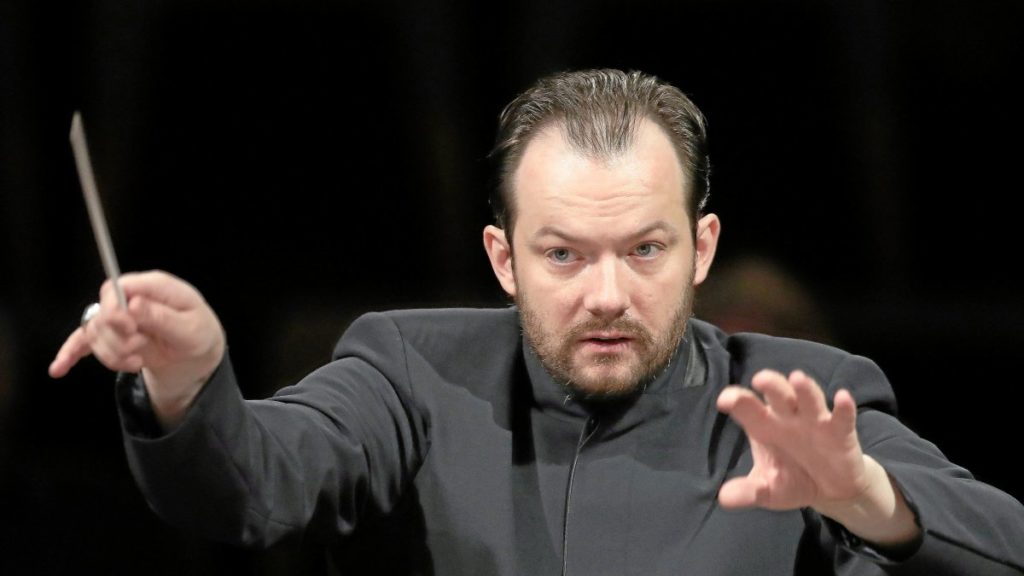
Berliner Morgenpost Die Wiener Philharmoniker unter Andris Nelsons liefern ein leuchtendes Gastspiel in der Berliner Philharmonie – mit Werken von...
“Although Nelsons’ gestures and directions don’t look like too much excitement or acute need for correction (a strength he shares with legendary...
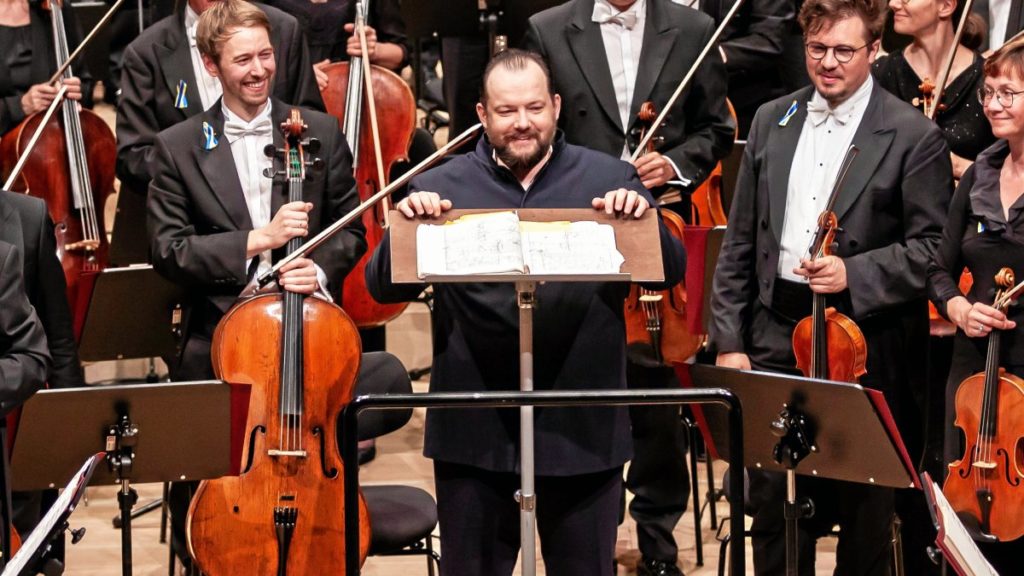
Hamburger Abendblatt Zwei Konzerte mit Andris Nelsons, dem Gewandhausorchester Leipzig und Pianist Rudolf Buchbinder in der Elbphilharmonie Zunächst „Top...
“Beyond the sheer aural bliss, there were endless subtleties to savour, some to do with purely musical things like the shaping of a phrase, others with the...
The Daily Telegraph What more civilised way to spend a wet Sunday afternoon than listening to three wonderful musicians playing three great piano trios? Like...
“Imagine a hundred elite athletes racing to a cliff edge and leaping over, not to their doom but to exhilarating flight. The opening of Richard...
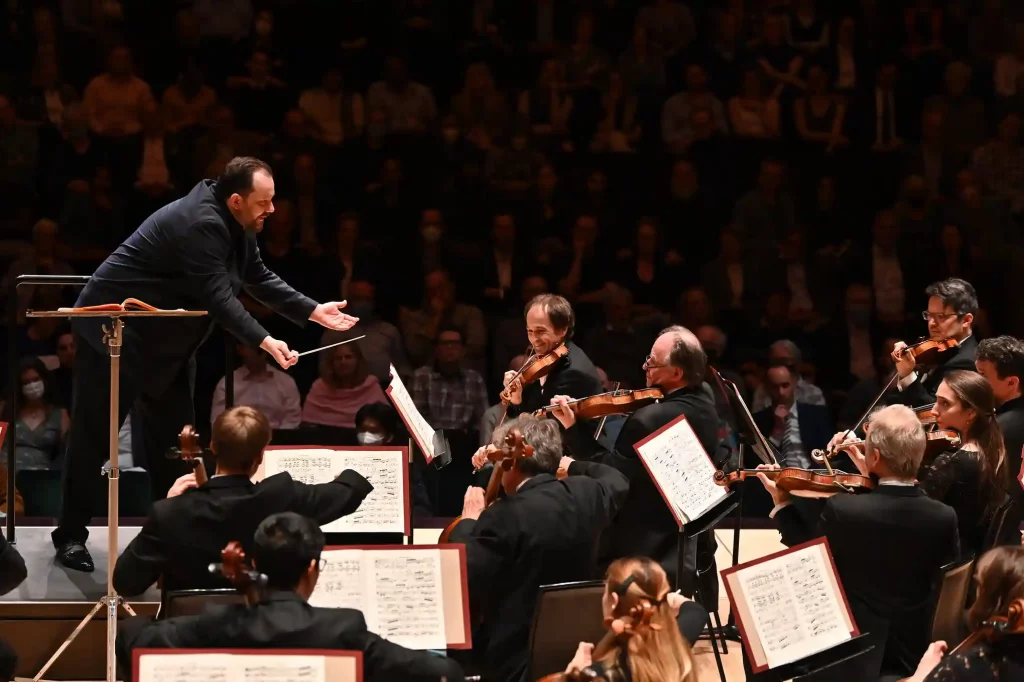
The Observer Imagine a hundred elite athletes racing to a cliff edge and leaping over, not to their doom but to exhilarating flight. The opening of Richard...
„The sense of noble self-assurance, free from arrogance or bombast, that he brought to the Heldenleben recapitulation was thrilling and startlingly novel.“
“Any suspicion that the project is merely an excuse for a couple of top orchestras to show off is soon dispelled. Nelsons’ Strauss is the opposite of...
“Nelsons animates them to real flights of fancy thanks to his rousing devotion; he literally lets us bathe in Prokofiev’s lush floods of sound, but at...
Münchner Merkur Er hockt da wie ein Fels vor dem Flügel: Affektierte Attitüde hat Yefim Bronfman nicht nötig. Der 53-jährige Pianist bringt sämtliche...
“Exciting, inspiring, profound, gripping – in short: this concert of the Munich Philharmonic Orchestra in the Isarphilharmonie, conducted by Andris...
“Nelsons and the BSO rendered this remarkable mixture of disturbing and melodious snippets, at times aggressive and at others delicate, evoking grobian or...
“The third movement dripped with sardonic pathos, with its several disparate melodies on a collision course toward a series of timpani thuds that sounded as...

Whether he’s conducting the Leipzig Gewandhaus Orchestra in Bruckner or the Vienna Philharmonic in Beethoven, Andris Nelsons is mindful of the profound, indefinable connection between a conductor and his musicians, he tells Peter Quantrill
Gramophone Conducting Bruckner’s Eighth Symphony is, on the face of it, an effective weight-loss strategy in itself: 80 minutes of hard cardio and unbroken...
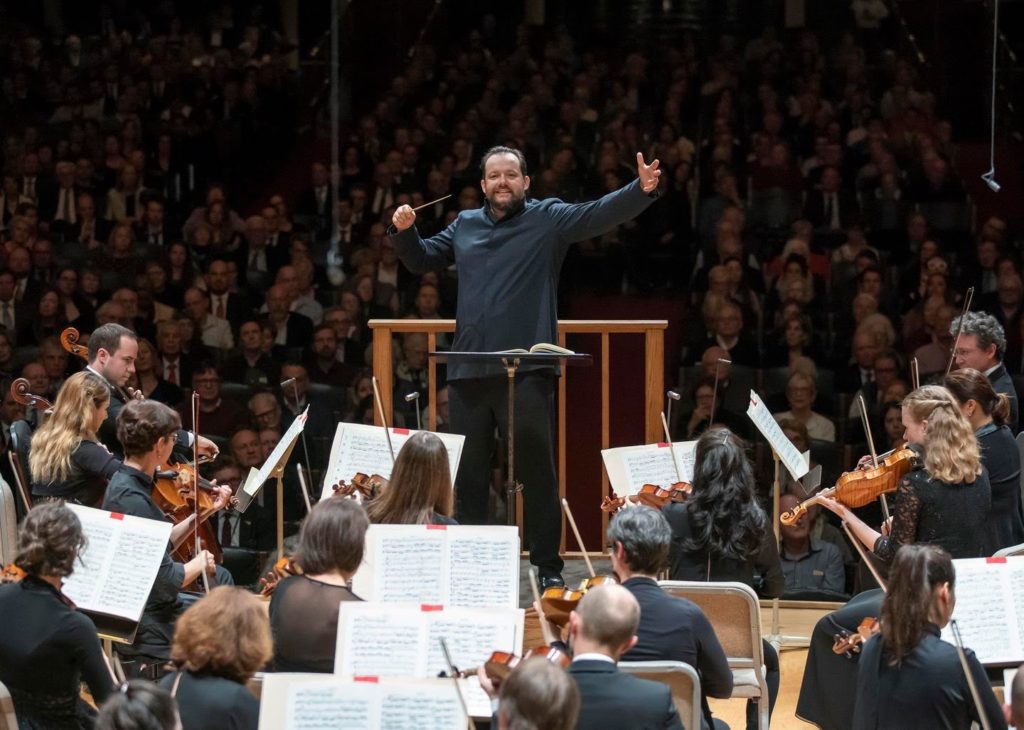
Nelsons brought off the Overture to Wagner’s “Flying Dutchman” as the dazzling orchestral showpiece that it is, and led a well-paced, compelling account of the Mendelssohn.
“In Mahler’s “Blumine” and Mendelssohn’s “Scottish” Symphony, the brass playing rang out with sylvan elegance, and the winds were impeccably...
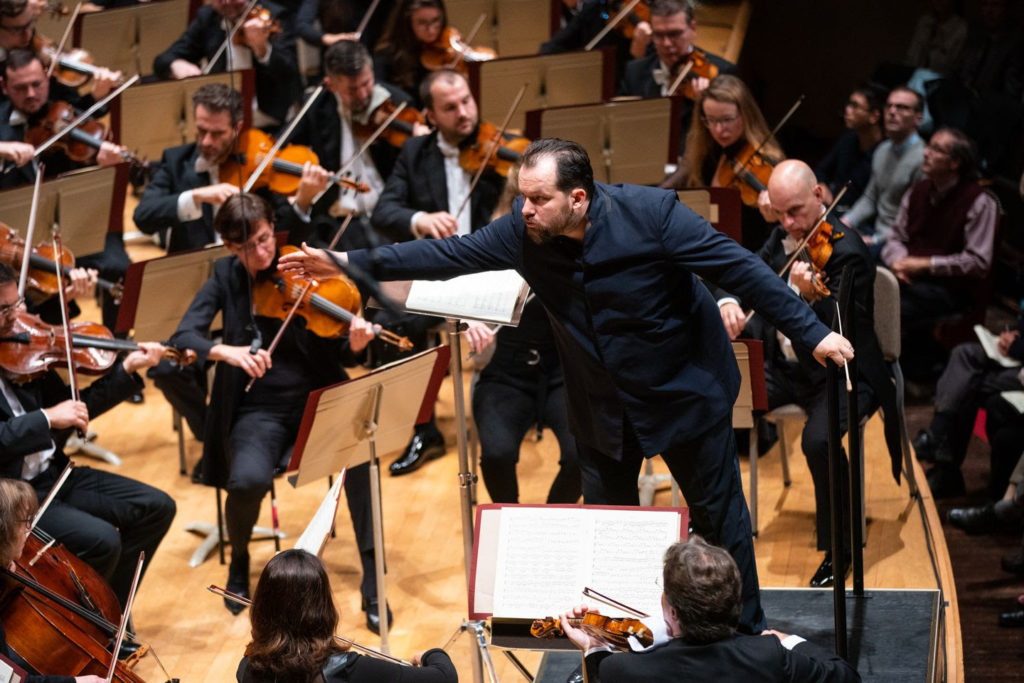
One might compare the Leipzigers to a well-oiled machine, but to do that would deny the sheer human efforts and years of practice necessary to be so solid. Within the GHO’s woodwinds and brass, tone colors and attacks matched each other so congruently that each section sounded like a single instrument with the slightest hint of reverb.
“Fire sang through the opening measures of the concerto, practically exploding off the stage, and the piece’s later lyrical orchestral episodes...
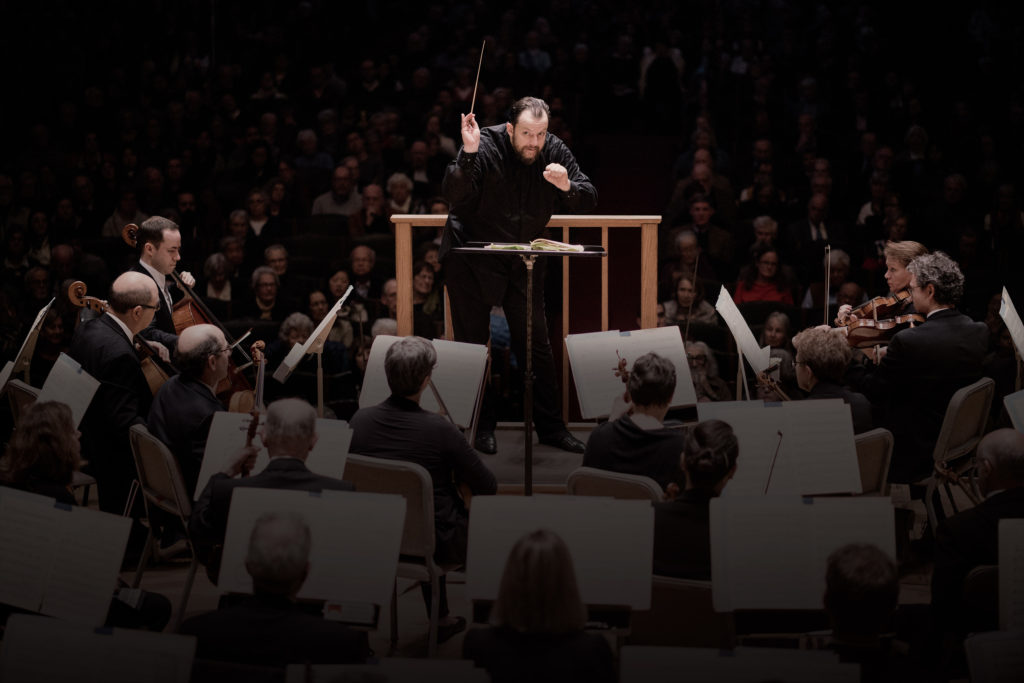
A great way to unwind, relax and experience the combination "intermixed" Boston Symphony Orchestra and Gewandhausorchester Leipzig Alliance explore the many historic connections between these two world-famous orchestras.
Thrive Global At Boston’s Symphony Hall this week, they’re not just making music—they’re making music history. The august Gewandhaus Orchester of...
The sound is tremendously sensual - the great tradition is resonating with it.
“The sound is tremendously sensual – the great tradition is resonating with it.” NDR
Nelsons led the work with a firm sense of momentum while highlighting its many details.
“Nelsons led the work with a firm sense of momentum while highlighting its many details.” “Nelsons navigated the orchestra and the soloist...
With Bruckner, Andris Nelsons follows in the footsteps of Masur and Blomstedt. But he surpasses them both in dynamic sharpness, highly emotional immersion and, in view of the consistently moderate tempi, in the goosebump feeling of infinite and unswerving flow. No brutal caesuras cut the musical line. Despite all their passions, they are deliberate interpretations, but not calculated and even less controlled by effects. Cosmically perfect in form, the Ninth, which has remained a torso, especially has it all in its visionary, redemption-free archaic. Even Karajan applauds benevolently from his place at the Right of God, of course also for the Wagner excerpts.
“With Bruckner, Andris Nelsons follows in the footsteps of Masur and Blomstedt. But he surpasses them both in dynamic sharpness, highly emotional...
And Gewandhaus conductor Andris Nelsons shows why he is also in demand worldwide as an opera conductor: he carries the singers on his hands, gives them enormous freedom and yet follows them safely with the orchestra, which he keeps supple and flexible.
“And Gewandhaus conductor Andris Nelsons shows why he is also in demand worldwide as an opera conductor: he carries the singers on his hands, gives...
Nelsons is entirely in his element in "La Mer", in this intoxication of colours and reflexes, of dazzling nuances and mirages, of controlled eruptions and cultivated breakers. And also his Saxon orchestra follows him in blind (self) trust with subtly animated tutti sound, wonderful details and enchanting solos (English horn, trumpet) through this precious seascape of the soul, followed by the first sharp cries of the season.
“Nelsons is entirely in his element in “La Mer”, in this intoxication of colours and reflexes, of dazzling nuances and mirages, of controlled...
All of this subtlety depends on fine execution. He [Bruckner] really does have to be played very, very well if the spaces that suddenly open up around the notes are not to seem a slackening of tension. It was one of the outstanding features of Nelsons’s reading - among the best Bruckner interpretations I've heard - that they never did. Every standstill was pregnant with consequence; and, while one could relish the beauty of sound (I was forever longing for the next beautiful phrase from the violins), one felt the pacing hidden in the background. Detail was luxurious, but architecture paramount, and Nelsons’s unshowy approach profoundly impressive. One could almost believe one had come across that impossible thing: the ego-less conductor. No exhibitionism here. He revealed Bruckner, with a relentless vision that takes us into the strangest places, as greater than ever.
“All of this subtlety depends on fine execution. He [Bruckner] really does have to be played very, very well if the spaces that suddenly open up...
Conductor Andris Nelson's contact with the orchestra also seemed to be more characterized by a collegial spirit than by a search for a perfect and perfectly executed statement. One can only rave about the precise softness of the brass sound.
“Conductor Andris Nelson’s contact with the orchestra also seemed to be more characterized by a collegial spirit than by a search for a perfect and...
And here in Lucerne, starting with the low, primitive sound of the rolling double basses, through to the effervescent flutes, the Gewandhausorchester took the 1919 version of the work like a second skin. Nelsons was on top form, poking the strings into their clockwork rhythms and the horns into a brassy bombast, so much so that in the huge conclusion, he used what almost looked like the muscular punch of a professional boxer. That said, this Firebird could hardly have been tackled with more conviction; in short, this performance was electrifying.
“And here in Lucerne, starting with the low, primitive sound of the rolling double basses, through to the effervescent flutes, the Gewandhausorchester...
Siegfried Idyll is literally breathed into life by Andris Nelsons, cueing the Leipzig Gewandhaus Orchestra to commune with the music, bringing a very expressive beauty and contentment, ravishing the listener’s senses with a mix of poignancy and poetry (the latter characteristic suggesting gentle breezes and palm trees) and further enhanced by a finely-judged array of dynamics: twenty-one minutes of bliss.
“Siegfried Idyll is literally breathed into life by Andris Nelsons, cueing the Leipzig Gewandhaus Orchestra to commune with the music, bringing a very...
The nebulous sounds surfacing at the beginning of the piece, symbolizing the (still) deep silence of the water, were played by the Gewandhaus Orchestra in such a floating tenderness that one wanted to hold one's breath. With pianissimos of the finest quality, Nelsons and the Gewandhausorchester took the qualities of the Elbphilharmonie acoustic to its limits. But also when the wave movements finally sloshed through the woodwind registers, the beatings of the timpani gave a hint of danger and finally the brass fanfares announced the happy arrival of the ship, the sound balance of this orchestra was unique and precise.
“The nebulous sounds surfacing at the beginning of the piece, symbolizing the (still) deep silence of the water, were played by the Gewandhaus Orchestra...
For sixteen months, Andris Nelsons has been chief conductor of the world's oldest bourgeois concert orchestra. He treats it with caution and awe. It is an archive of knowledge, sounds and feelings. The musicians, who can tell a lot of stories about various conductors, their irascible anger, their linguistic weapons of intimidation, their strategies to establish authority, are currently enthusiastic about Nelson's gentleness, his human warmth, but also his artistic spontaneity, his interpretational unpredictability in a good sense.
“For sixteen months, Andris Nelsons has been chief conductor of the world’s oldest bourgeois concert orchestra. He treats it with caution and awe....
"In Petrushka, Nelsons worked like a realist painter, drawing attention to the many solos and small ensemble passages ... A tone poem as much as a ballet score, Petrushka, in Nelsons' hands, brimmed with lively characters and scenes."
“Aether was once a popular and compelling scientific concept. Nineteenth-century physicists believed it filled the space between stars, and ancient...
"Nelsons was able to express both the innocence and the foreshadowing of experience Shostakovich weaves through the first movement by simply allowing the music the space to speak for itself."
“Nelsons was able to express both the innocence and the foreshadowing of experience Shostakovich weaves through the first movement by simply allowing the...
"But Nelsons’ fluent direction suggested that music was indeed the master. The orchestra responded beautifully to his waving gestures. The soft attacks and silky phrases the conductor conjured carried sweet sadness, and the solo passages shimmered."
“In the final scene of Richard Strauss’s Capriccio, Countess Madeleine must choose between the writer Olivier and the composer Flamand. The feelings...
Where the Lucerne Festival Orchestra sounds like one of those bright 21st century glass skyscrapers, the Gewandhaus sounds like a sumptuous Gothic palace that has been regularly restored, but has kept its original colours and materials. The strings have the dark patina of antique furniture, the matt brass evokes an organ with wide and deep stops, never flashy. Andris Nelsons' warm direction trusts musicians whose mutual listening is permanent, his little aesthetic body language invites more than it imposes. The result is a luminous Bruckner Eighth, which flows from the source and trusts the music, without seeking to prove anything. And this is does a lot of good.
“Where the Lucerne Festival Orchestra sounds like one of those bright 21st century glass skyscrapers, the Gewandhaus sounds like a sumptuous Gothic...
"Performances of great strength and stature, peerlessly played and recorded; the pinnacle of Nelsons’ cycle thus far."
“This, the third instalment of Andris Nelsons’ Boston cycle, is also the finest. He sheds new and startling light on the Fourth and delivers an...
Mr. Nelsons and the Bostonians maintained precision while relishing this finale’s inconstant rhythms — dances that capriciously recalled golden-age Hollywood and the Middle East.
“Throughout, Andris Nelsons was the master craftsman, giving directions that were always crisp but varied in breadth from fine tuning up to strokes so broad as to be violent."
“…there’s no doubting the power and theatricality that Nelsons brings to this music. …the finale was irresistible, sweeping all before it on a flood of...
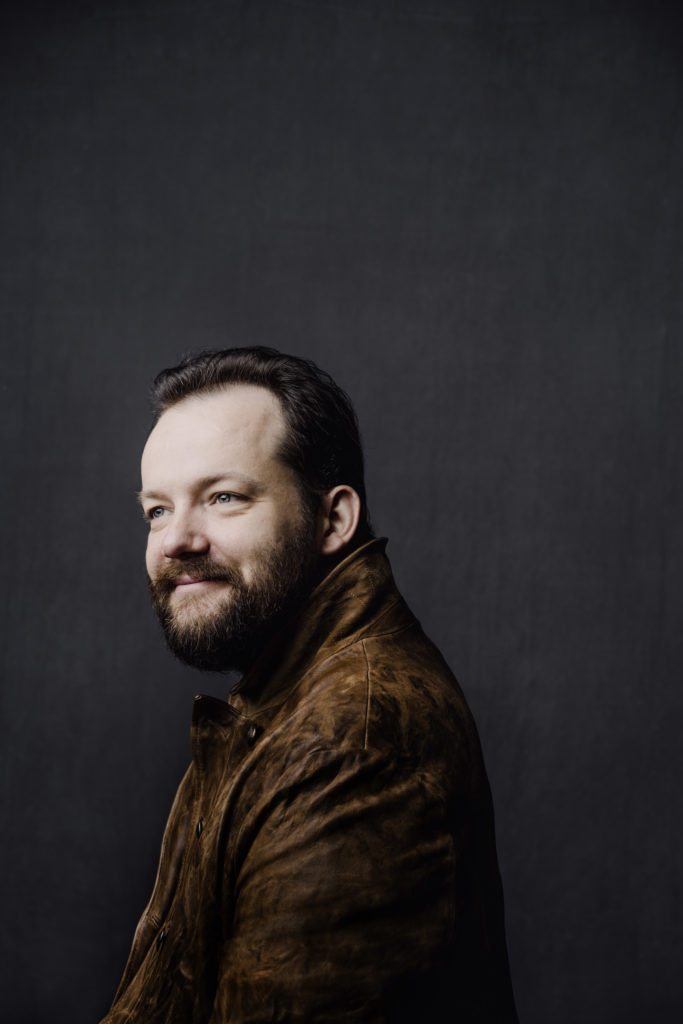
We caught up with the Latvian conductor last week at Tanglewood in Massachusetts to discuss the Boston Symphony Orchestra's European Tour, which begins this weekend as part of the BBC Proms...
Having just completed two months of music-making and mentoring at Tanglewood, their summer home in Western Massachusetts, you’d think the musicians of the...
Nelsons, a leading Puccini interpreter, provided a remarkably sensitive account of the death scene, avoiding melodramatics yet observing the composer's skull-and-crossbones notation in the score's margin, requesting a "long pause" to mark the moment of Mimi's passing. The freeze-frame suspension of music and action was breath-stopping, and ineffably sad.
Andris Nelsons was the champion of the evening, drawing luminescent playing from the Covent Garden orchestra.
The Act 1 Prelude – an evocation of The Grail – was played with the curtain down and the house lights half up, gauzy strings shimmering and beautifully...
Over this coolly calculated staging an inspiring glow of light and warmth shines from the orchestra pit by the baton of Andris Nelsons.
Wagner conducting of this quality, so well-paced and richly involving, gloriously played and sung by the Royal Opera orchestra and a bolstered chorus, does not...
Nelsons’ gloriously comprehensive conducting, full of moments of quiet, rapt intensity and surging, tremulous excitement, superbly realised by the ROH Orchestra, is one of this new production’s biggest plusses of all.
Their chemistry onstage is unmistakable. The result so far is two consecutive Grammy awards for Best Orchestra Performances. With disarming sincerity, casual generosity, and boundless optimism, he
has released the potential of the Boston Symphony Orchestra.
A reverence for the past surrounds virtually every square foot of Tanglewood, the beautiful summer home of the Boston Symphony Orchestra. The expansive lawn...
"A premiere and a persuasive start to Brahms cycle from Nelsons and BSO [...]
The Andris Nelsons era with the Boston Symphony Orchestra was largely grounded in the standard repertoire in the music director’s inaugural season. Yet new...
"BSO offers poignant election-night respite [...]
Spirits were calm for the most part, as the first half kicked off with the cinematic fanfare that began the world premiere of Eric Nathan’s “the space of a...
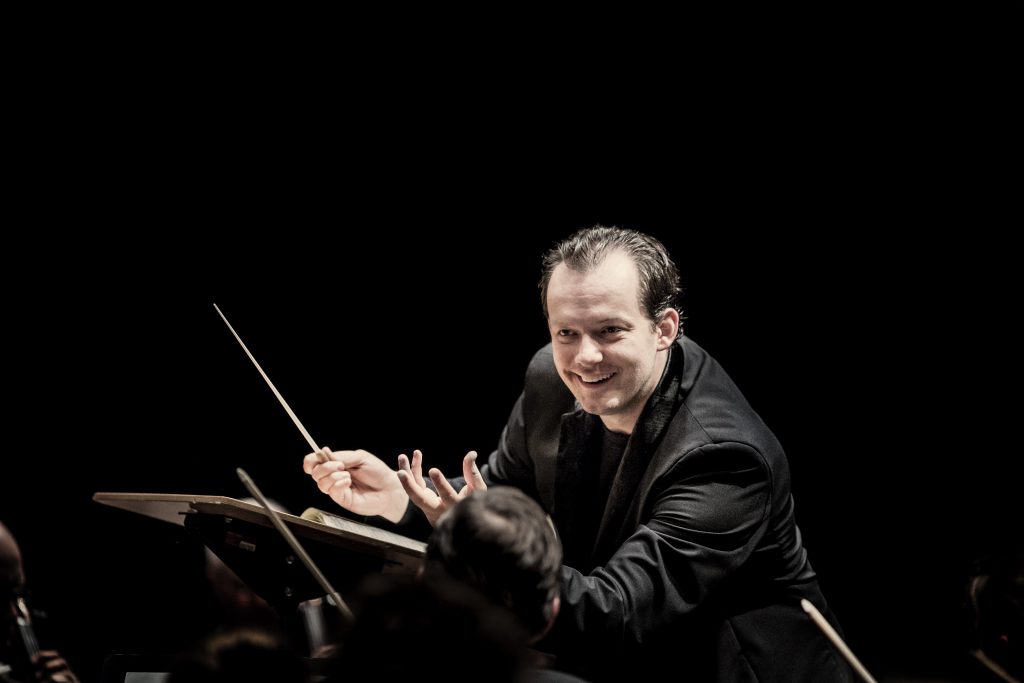
"Classical conductor Andris Nelsons will become an honorary professor of Jazeps Vitols Latvian Academy of Music, LETA was told at the academy."
Read the entire announcement via The Baltic Course
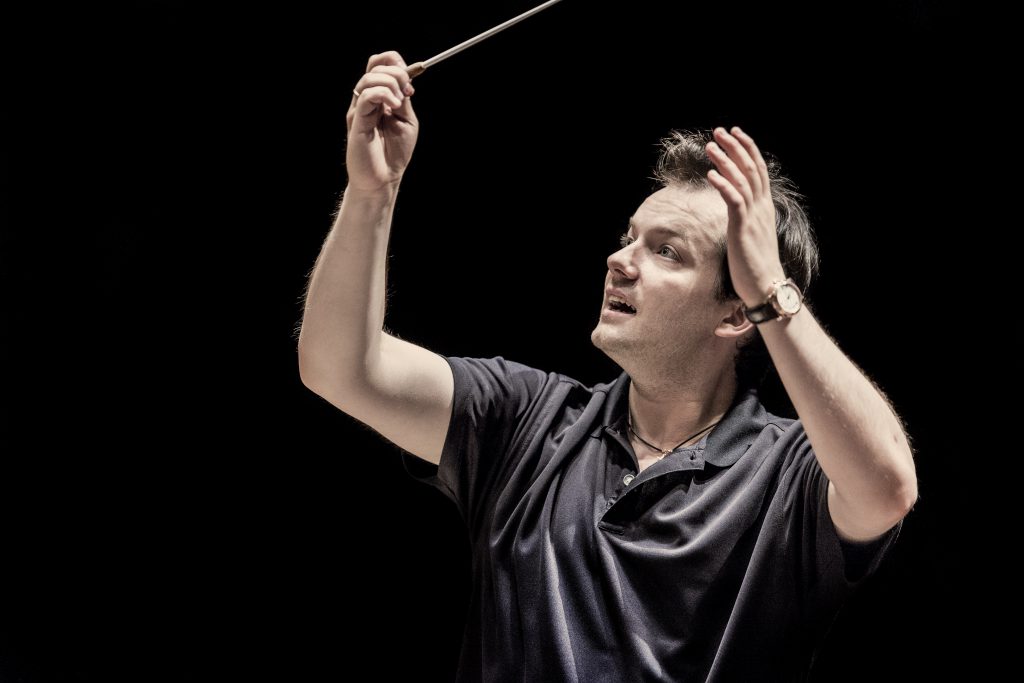
“The energy of an orchestra can be a great source of inspiration [...]
Young Latvian conductor Andris Nelsons, Music Director of the City of Birmingham Symphony Orchestra, ranks among the leading exponents of his art. Talking to...
"A Delicious ‘Rosenkavalier’ in Boston [...]
In a city regularly starved of quality opera, Andris Nelsons’s habit of conducting Strauss with his Boston Symphony Orchestra can only be welcome. First...
"Rosenkavalier Shimmers at Symphony Hall [...]
Many a moon has passed since Bostonians were last offered the rich feast that is Richard Strauss’s Der Rosenkavalier. Last night that famine was assuaged in...
"The BSO opens its season with a Russian bang [...]
The opening program for the Boston Symphony Orchestra’s 2016-2017 season was all-Russian, and even without any Tchaikovsky, Stravinsky, or Rachmaninoff on...
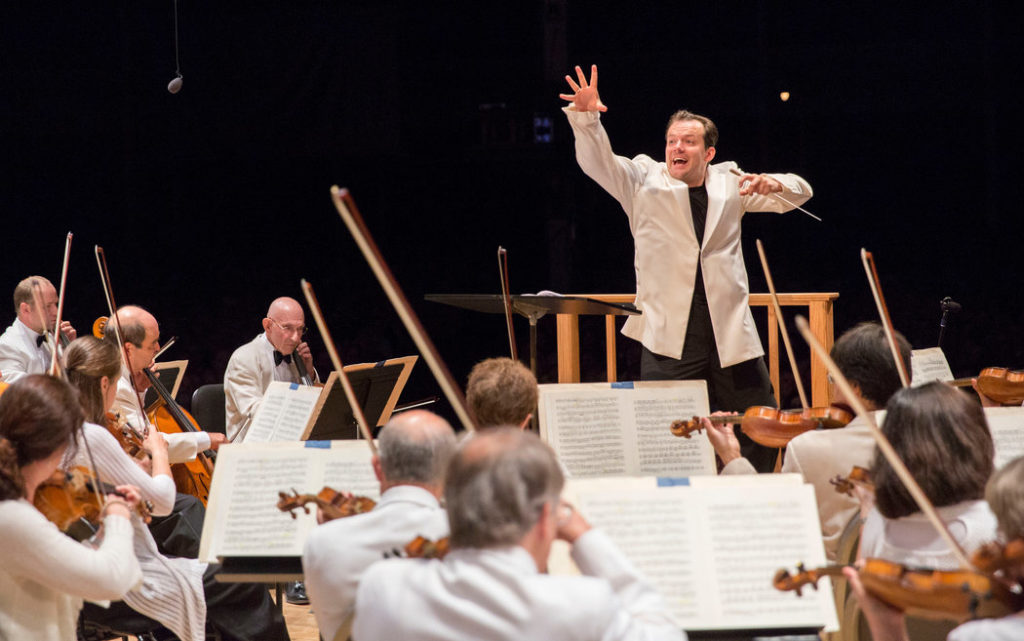
"Watch: Andris Nelsons Conducts Beethoven's Ninth at Tanglewood [...]
It’s become an annual tradition of the Boston Symphony Orchestra and a rite marking the end of summer in the Berkshires: a performance of...
Andris Nelsons at the helm on two Gramophone Award-winning albums in 2016
Read the entire feature via Gramophone Magazine “let me tell you” – Andris Nelsons (conductor), Barbara Hannigan (soprano), and the Bavarian...
"Tanglewood: For Nelsons, last comes first [...]
On his arrival every summer at Tanglewood, Andris Nelsons submits to a ritual round of interviews with the media […] He lets the music speak for...
"The Boston Symphony Orchestra, Andris Nelsons, and Deutsche Grammophon have expanded their award-winning recording partnership by extending their original agreement, which focused primarily on Shostakovich Symphonies 5-10 (works composed during the period of Shostakovich's difficult relationship with Stalin and the Soviet regime, mid-1930s to 1953), to include live recordings of the composer's entire canon of 15 symphonies, plus the masterpiece opera, Lady Macbeth of Mtsensk [...]
The first album of the new partnership between the BSO, Nelsons, and DG, Shostakovich’s Symphony No. 10, released in July 2015, won the Grammy Award for...
"Nelsons, BSO stand strong in uncompromising Mahler Ninth [...]
Leading the Boston Symphony Orchestra Thursday night, Andris Nelsons had the air of a man fiercely concentrating on a challenging task: crafting a coherent...

"Two of the greatest artists in this city, usually thought of as soloists but appearing tonight, for the first time ever in an interview as a duo [...]
Andris Nelsons (@andris_nelsons) hails from Riva, Latvia, and after one year as the music director of the Boston Symphony Orchestra, he recently extended...
"Mr. Nelsons has brought a jolt of youthful energy, along with charisma and accomplishment [to the Boston Symphony Orchestra at Carnegie Hall]. The audience gave Mr. Nelsons and the players an enormous ovation. Whatever the future, for now the Boston Symphony has placed its trust in a young dynamo."
"Album of the week" - Shostakovich: scandalously successful."
"Nelsons leaned forward into the sound, sculpting the music with surpassing tenderness."
"Nelsons’s performance [Shostakovich’s Symphony No. 10] is mighty, marked by a wonderful nose for atmosphere [...]
What makes Nelsons so lethally impressive here is the precision with which he addresses every accent, every ferocious sforzando. He is the most rhythmic of...
'This [Shostakovich’s 10th Symphony] is thrilling music-making, already whetting the appetite for the next instalment: Symphonies 5, 8, and 9 next spring [Deutsche Grammophon]."
"This was a persuasive account [of Bruckner’s Symphony No. 7]: texturally vital, musically alert, and sonically rich. […] Nelsons’s interpretation found a charismatic balance between weight and transparency of detail, from the diaphanous sheen of the pianissimo tremolos to the radiant brass-heavy climaxes of the first and second movements."
"Every time I’ve seen him conduct - in Boston, Tanglewood, New York, and Bayreuth - he has set off brushfires of intensity. […] Nelsons produces full-body impact: instead of shattering about your ears, the sound engulfs you. He is a master at controlling dynamics to create a kinetic, fluctuating mass."
"Nelsons’s Brummies [the CBSO] pump fresh air through the notes. […] His sunrise is sublime in the original, uncorrupted meaning of that word – an unfathomable beauty so awe-inspiring that it terrifies with the same intensity it beguiles [...]
A sensibly paced tempo that refuses to let Strauss’s material become weighed down by its own import helps; […] Nelsons keeps a discreet distance, letting...
"Andris Nelsons conducted with keen focus and vigor, eliciting tonal beauty, technical precision and obvious engagement from the orchestra."
"Friday’s concert, the last of Mr. Nelsons’s first subscription run [with the Boston Symphony Orchestra], was hardly lethargic. With an unusually large audience, the orchestra was engaged and the conductor infectiously dynamic with performances of Beethoven, Bartok and Tchaikovsky [...]
It was just his fourth concert in his new role, but it felt as if Mr. Nelsons had been working under Symphony Hall’s golden proscenium arch for years. The...
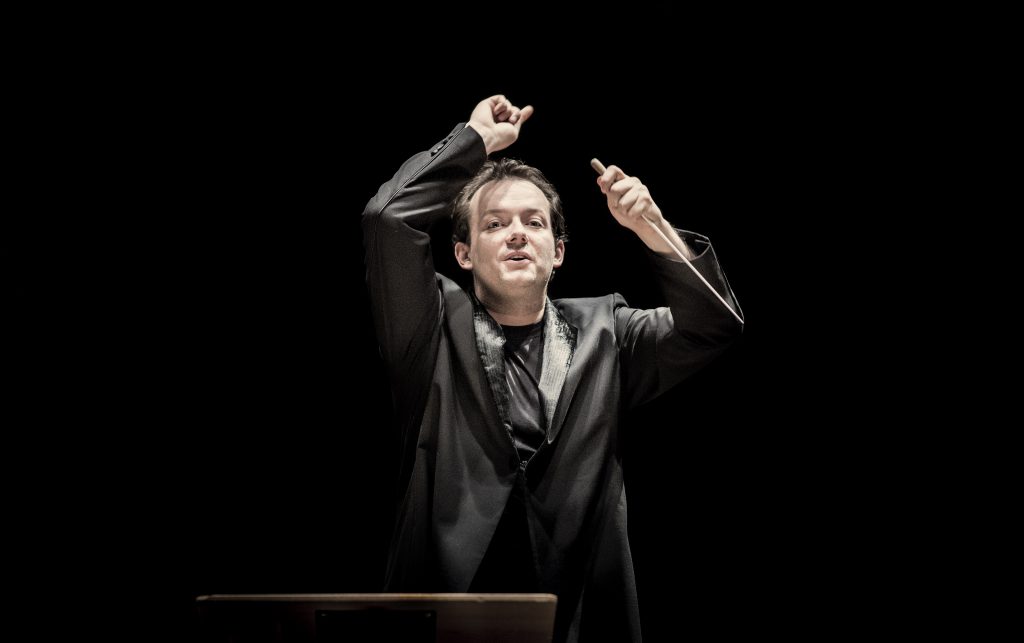
"New Boston Symphony Music Director Andris Nelsons: 'It's Not A Job — It's Life' [...]
Andris Nelsons is a bear of a man. The 35-year-old Latvian conductor, who will become the Boston Symphony Orchestra‘s youngest music director in more...
"Nelsons’ treatment of the Fourth [Symphony of Beethoven with the CBSO] was startling. Like all outstanding conductors, he has the precious ability to conjure something unexpectedly brilliant out of thin air [...]
He did it a year ago in another matinee concert with the CBSO in Dvořák’s Eighth Symphony, and Beethoven’s Fourth here was cut from the same cloth. Its...
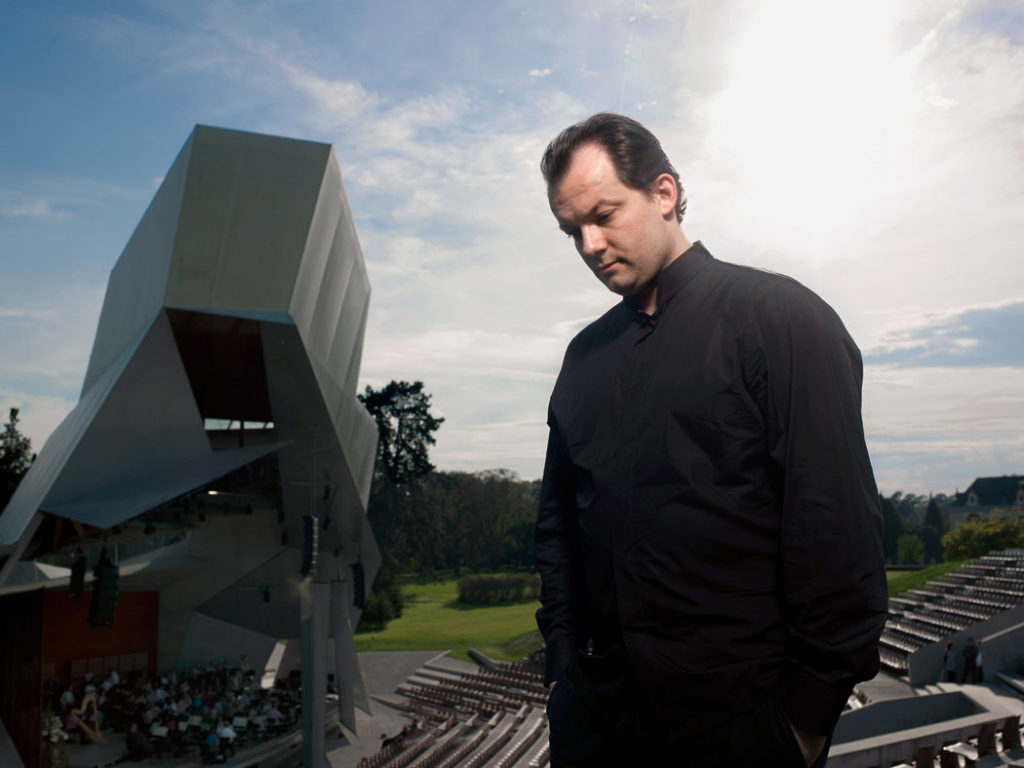
"Andris Nelsons Gets Ready to Lead the Boston Symphony [...]
He was a terror at Tanglewood, the summer home of the Boston Symphony Orchestra, careening around the campus in a staff golf cart, his gangly 6-foot-2 frame...
"For his part, Nelsons has deeply internalized this score [of Salome by Strauss], its idiom, and its pacing, to the point of almost dancing along on Thursday during his delicately shaped 'Dance of the Seven Veils' [...]
Balances were for the most part carefully managed, allowing for a striking clarity of detail while also setting up for a handful of truly hair-raising moments...
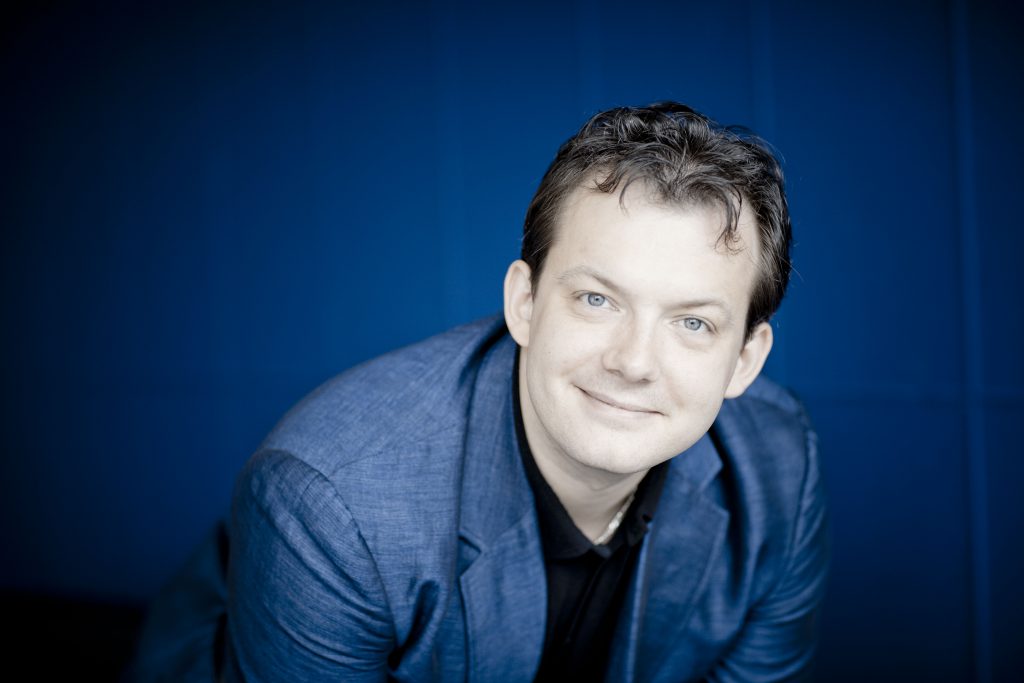
"Charismatic young conductor Andris Nelsons is a talent in global demand. Since joining the CBSO in 2007 his reputation has soared – a thrilling debut at last year's Proms will be followed by the opening night at Bayreuth this year. He talks to Fiona Maddocks about growing up in Riga, Simon Rattle's legacy and Birmingham's bid for UK City of Culture 2013 [...]
Everywhere you turn in Birmingham, banners and hoardings urge you to “Join the Big Conversation”. This is the slogan for the city’s bid to...